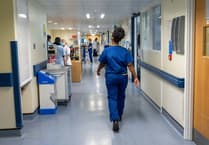FRONTLINE health and social care staff, people involved in food production and delivery, and utility workers are among a list of workers deemed "essential" to the Covid-19 response.
The Government published a list of "key workers" just after midnight on Friday - later than expected - whose children will continue to be cared for at school amid the coronavirus pandemic.
It includes healthcare workers such as doctors and nurses, police, teachers, and food delivery staff.
But unions have warned the list is so extensive that schools could struggle to cope.
The Department for Education said: "If your work is critical to the COVID-19 response, or you work in one of the critical sectors listed below, and you cannot keep your child safe at home, then your children will be prioritised for education provision."
It added that children with at least one parent or carer identified as critical workers by the government could send their children to school if required.
The Department for Education said they expected the majority of educational establishments to stay open where required - but recognised it may be "impossible" for small rural schools.
It said when a school is unable to stay open, it would work with local officials to find an alternative setting for pupils, as well as providing transport arrangements.
The list has been separated into eight categories, including health and social care, education and childcare, key public services, and transport.
Key public services are deemed to include those essential to the running of the justice system, religious staff, charities and workers delivering key frontline services, journalists and broadcasters providing public service broadcasting, as well as workers responsible for the management of the deceased.
Those involved in food production, processing, distribution, sale and delivery are also included, along with "administrative occupations essential to the effective delivery of the Covid-19 response" in local and national government.
Staff needed for "essential financial services provision", such as bank workers, key telecommunications staff and postal services and delivery workers are also on the list.
Geoff Barton, general secretary of the Association of School and College Leaders, warned parents they must not assume Monday will be "business as usual".
Urging parents to keep their children at home "if at all possible", he said: "The key worker list is extensive and schools will not be able to cope with the number of children who could potentially arrive on Monday morning.
"Schools will endeavour to do their best to provide continuity of learning for all children whether at home or in school, but the provision in school is likely to be more akin to childcare than a normal timetable."
Paul Whiteman, general secretary of the National Association of Head Teachers (NAHT), said continuing to send children to school should be a "last resort, for the minority of key workers, who have no alternative".
He added: "School leaders have many questions that remain unanswered about how this will work in practice."
Neil Leitch, chief executive of the Early Years Alliance, called for urgent clarity on whether childminders are included on the list.
"As it stands, the guidance states that ’nursery and teaching staff’ are counted as key workers, with no reference to childminders," he said.
"We are asking the Government to confirm as a matter of urgency that they too are included in this critical list."
Many English schools will stop operating on Friday afternoon until further notice, as will nurseries, colleges and childminders.
Special schools are to remain open during the closures, while educational settings will continue to cater for vulnerable children and pupils whose parents are key workers.
In Scotland and Wales, all schools will have closed by Friday, and schools in Northern Ireland are due to shut from Monday.
GCSEs and A-levels in England and Wales will be cancelled - although Prime Minister Boris Johnson said there were plans for students to receive qualifications.
The Education Secretary has indicated guidance about exam cancellations will be issued on Friday, including how pupils unable to sit their exams will get their grades.
Gavin Williamson said the Government would work with schools, colleges and England’s exams regulator, Ofqual, "to ensure children get the qualifications they need".
School leaders have said they expect that grades will be based on teacher assessment and evidence of internal assessment - such as mock exams - which could then be submitted to the exam boards to check.
---
The Review are working hard to keep you informed by providing trusted information and helpful context.
Whilst efforts are being carried out to deal with the Covid-19 crisis, everyone can practice social distancing without ignoring the needs of our community. During these challenging times follow all guidelines to protect yourself and others, be safe and be kind, keep in contact by telephone with those vulnerable members amongst us, and practise all sensible precautions.
As always, our coverage is free for all to read www.theforestreview.co.uk




